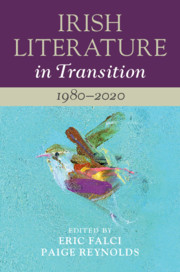Book contents
- Irish Literature in Transition, 1980–2020
- Irish Literature in Transition
- Irish Literature in Transition, 1980–2020
- Copyright page
- Contents
- Contributors
- Series Preface
- General Acknowledgements
- Acknowledgements
- Introduction
- Part I Times
- Part II Spaces
- Part III Forms of Experience
- Chapter 11 The Irish Realist Novel
- Chapter 12 Faith, Secularism, and Sacred Institutions
- Chapter 13 Writing the Tiger: Economics and Culture
- Chapter 14 Violence, Trauma, Recovery
- Chapter 15 Modes of Witnessing and Ireland’s Institutional History
- Coda: Edna O’Brien and Eimear McBride
- Part IV Practices, Institutions, and Audiences
- Index
Chapter 15 - Modes of Witnessing and Ireland’s Institutional History
from Part III - Forms of Experience
Published online by Cambridge University Press: 28 February 2020
- Irish Literature in Transition, 1980–2020
- Irish Literature in Transition
- Irish Literature in Transition, 1980–2020
- Copyright page
- Contents
- Contributors
- Series Preface
- General Acknowledgements
- Acknowledgements
- Introduction
- Part I Times
- Part II Spaces
- Part III Forms of Experience
- Chapter 11 The Irish Realist Novel
- Chapter 12 Faith, Secularism, and Sacred Institutions
- Chapter 13 Writing the Tiger: Economics and Culture
- Chapter 14 Violence, Trauma, Recovery
- Chapter 15 Modes of Witnessing and Ireland’s Institutional History
- Coda: Edna O’Brien and Eimear McBride
- Part IV Practices, Institutions, and Audiences
- Index
Summary
For most of the twentieth century, Ireland had a system of residential institutions – known as Industrial Schools – for children. These institutions were funded and overseen by the Irish state, and run by the religious orders of the Catholic Church. Though the institutions were intended to provide children with vocational education for industrial employment and to respond to perceived problems of poverty and anti-social behaviour, in reality children were incarcerated in these residential institutions and physically, emotionally, and sexually abused. This chapter traces how Irish culture has galvanised official state responses to this history, and how contemporary narrative practices and technologies, in particular digital humanities, can facilitate greater understanding of Ireland’s difficult past.
- Type
- Chapter
- Information
- Irish Literature in Transition: 1980–2020 , pp. 278 - 294Publisher: Cambridge University PressPrint publication year: 2020
- 2
- Cited by

